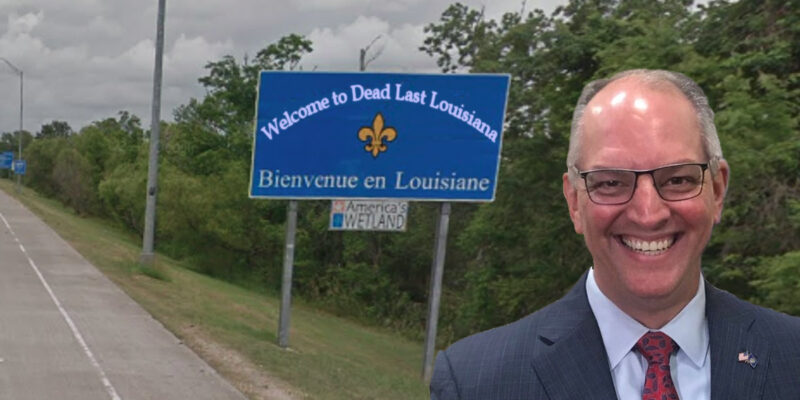The comparison website 247WallSt is famous for posting lots of rankings of states and cities on various criteria, with varying degrees of credibility. It’s a site not dissimilar to WalletHub, in that much of its content is worth a passing glance but not too much more.
But when a writeup like this one shows up, as it did yesterday, maybe it’s worth more than a passing glance. Writer Douglas A. McIntyre just annihilated the Bayou State as a venue to do business in an especially rude article, entitled “Business Should Flee Louisiana As Soon As Possible.”
Louisiana has been one of the worst states to live in the US for decades. The state has a low median income, poor healthcare, high crime, and poor infrastructure. Today, there is a new reason, particularly for business. CNBC named it the worst state to do business in (aside from Alaska, where no one lives).
Louisiana does poorly across almost every metric used by CNBC. It is at the bottom based on the quality of the workforce, infrastructure, economy, “life, health, and inclusion,” and technology & innovation.
To make matters worse, Louisiana also makes CNBC’s “America’s worst places to live.” Health statistics for the state are alarmingly poor. The financial news outlet reports, “According to FBI statistics, the violent crime rate is among the nation’s highest.”
The major problem is that it will take decades to move well up the ladder when states show up at the bottom of these lists. Healthcare is a matter of state policy, and access to capital requires changes in financial institutions and state policy. Pulling people out of poverty also includes access to vast capital, a new generation of teachers, and restructured schools. Many of these schools are part of districts the state government does not control.
It’s a clickbaity piece, to be sure, but McIntyre isn’t exactly wrong. We’re at the bottom of all the good metrics and at the top of all the bad ones. And Louisiana has a poverty problem that can’t be solved in the short term.
Some of the metrics CNBC and others use are dumb, of course. “Inclusion” is a meaningless word which often covers things like how many black- and woman-owned businesses a state has, and you can score really well in that but the identity of the ownership of a business is useless as a means of evaluating whether it’s a good place to work and whether the employees are happy, well-paid and so on.
All of which is quibbling about the edges of something which is true. Here are the sad facts about Louisiana, all of which have gotten markedly worse in the past eight years…
Advertisement
- All of our major cities are shooting galleries where legitimate business – everything from banking to retail to what manufacturing used to exist – is bleeding profusely out of town.
- The educational attainment in our public schools is largely stagnant; while Louisiana has been moving up in some of the educational rankings, it’s largely because some of the states who used to be a little above us have collapsed, with COVID lockdowns a key factor.
- We have an exceedingly weak business community in Louisiana, and it’s getting worse – a decade ago, Louisiana had three Fortune 500 companies headquartered here, and two of the three are gone now, and what home-grown firms could end up joining that list eventually are growing their operations in other states rather than here.
- Oil and gas, long the top employer in Louisiana, is all but gone as a growth industry, and what economic activity there does seem to be in that sector is largely centered around the false, wasteful notion of drilling carbon capture wells to sequester plant food thousands of feet below ground. That’s activity designed solely to attract federal largesse; it produces nothing of value that anyone could buy, sell or use to manufacture something of value.
- Tourism in Louisiana has proven not to be a remedy for poverty, and with the collapse of public safety in New Orleans its viability is now in question. Hotels and restaurants are doing soft business in the state’s tourist capitals.
- Louisiana’s state budget depends on federal swag, and it’s now over $50 billion per year – a doubling during Edwards’ time in office while Louisiana has actually lost population. Public spending is now crowding out the state’s private sector, and it’s difficult to find much evidence that any of it is creating real wealth.
That’s Edwards’ legacy. He’s perhaps the most substantial failure as a governor in Louisiana’s history, though his tenure hasn’t been reported as such. Part of that is the state’s news media, which has covered for Edwards in every bit the same manner as the national media has covered for Joe Biden, but that isn’t the whole story. There are lots of Republican quislings, particularly in the state legislature, who have gotten in bed with Edwards and assisted him in his socialization of our economy and enervation of our private sector – look at what he’s done in turning health care in Louisiana into something of a corporate fascist project, with zero pushback from our legislature.
It’s been a shameful eight years and for as rude as 247WallSt’s assessment was, they’re correct that it’ll take many years to recover. Louisiana was in bad shape before Edwards got here, but not long ago there was some reason to believe the state would ride the wave of Southern growth to some degree of prosperity. Instead, we’ve simply fallen further and further behind our neighbors as they’ve grown.
Vote for radical change this fall. Either that or McIntyre’s exhortation to get out of dodge seems like very good advice.
Advertisement
Advertisement

